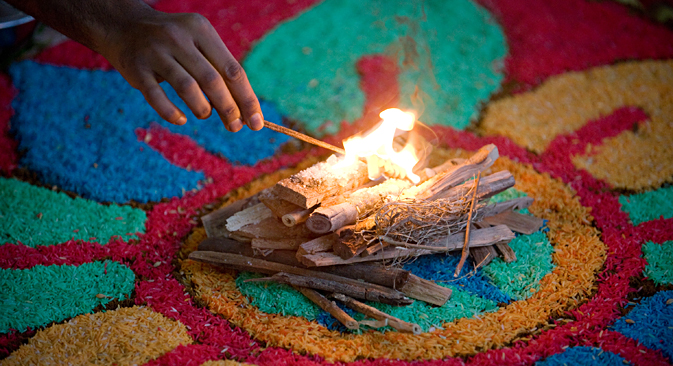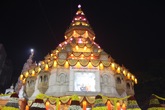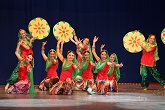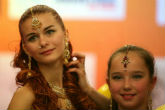Moscow’s Indians set to celebrate Diwali

Many Indians in Moscow perform pujas at home during Diwali. Source: Photoshot/Vostock-Photo
The number of Indians in Russia’s capital is very small, if one compares it to the Diaspora living in Washington, London and Melbourne. But Indian families living in Moscow celebrate Diwali, “the festival of lights,” with no less enthusiasm and fervour, every year, abiding by the laws of Russia. Diwali, which symbolizes the ultimate victory of good over evil, of brightness over darkness, has now become one of the most popular festivals of Indians in Moscow.
In the Russian capital, unlike the Durga Puja, there are no special common puja ceremonies at a particular venue with the participation of the Indian families. Moscow’s Indians perform Lakshmi Puja inside their apartments and light diyas or even candles as a matter of “choice and convenience.” Generally, they do not indulge in bursting fire-crackers just outside their apartments, keeping in view the local security rules.
People also generally prefer to not light diyas outside their flats. In this connection, I recall an anecdote that sometime during the Soviet-rule, an enthusiastic Indian family placed burning diyas outside their apartment to mark Diwali. The local police immediately arrived at the scene and stopped it with strict warnings. This anecdote is even today narrated at every Diwali, when it comes to place the burning diyas after the Lakshmi Puja at the door of Indians’ apartments.
When I came to Moscow in February 1978, Diwali was not marked even at the Indian Embassy’s premises. Here, the Diwali celebrations started to be publicly held only following the collapse of the Soviet Union. Some members of the Indian Community began to “very modestly” organize Diwali functions at the Embassy’s D.P. Dhar Hall or some other place with the Indian ambassador as the chief guest.
Out of the five days during which the Diwali is celebrated, Dhanteras (the Day of Wealth) on the first day and Badi Diwali (Big Diwali) on the third day are considered the most auspicious days.
On Dhanteras, people worship Lakshmi and especially housewives purchase new kitchen utensils, home appliances and golden and silver jewellery. “This remains an all-time Diwali shopping favourite,” Savitri Srivastav, a housewife said. “But there is no shopping-spree for Indian housewives here in Moscow.” She added that there were no special Indian sweet shops in the city. “So we are depending on our home-made sweets and snacks,” Srivastav said.
The Badi Diwali is the main day of the celebrations of the festival. Indians in Moscow perform Lakshmi Puja on this day in the families and offer prayer to her to bless them with wealth, prosperity and happiness. Following the prayers with the sonorous strains of prayer songs to Lakshmi, amid the wafting fragrance of incense, the people distribute sweets as prasad (blessings of happiness) to the friends whom they invite on Diwali to participate in the Puja with their family members.
Talking about the celebrations of Diwali, this year on October 23, the President of the Diwali Fair Committee, Sammy Kotwani said, “We are unable to organize the Diwali Fair on the actual date of October 23, as members of the Indian community in Moscow, in general, celebrate the Puja at their homes with their Indian and Russian friends. This is the case almost each year.”
“If we hold the Diwali Fair on the same day very less number of people will be able to come to the events. Therefore, as in previous years, this time too, we will organize the festival not on the actual date of Diwali, but on Novermber 1,” Kotwani said. He added that this year the theme of Diwali Fair is the “Maitri-3” (a celebration of friendship) which will be held at Izmailovo Concert Hall of Moscow.
“The main aim of a variety of events being organized at the fair, is to bring together both Russians and members of the Indian community in Russia and give everyone a chance to relax in a homely environment, develop mutual relationship and friendship on the occasion of our traditional festival,” he noted.
According to the Diwali Fair Committee, the programmes to be presented on Diwali, include games for children and adults, decoration of henna on the palms and wrists, rangoli competition, colourful decoration (Diwali Diya), Lucky Draw (lottery), performances of local and international groups and different Indian foods and dishes. There will be all kinds of Indian goods, clothes, spices, decorations and other merchandize at different stalls at the fair.
One special feature of the Diwali, this year, will be that not different dance troupes will perform separately at the stage, but they have merged into one single group to perform to the fusion of a single music concert.
Of course, Indian students studying in Moscow, come in large numbers to participate in the Diwali Fair and enjoy the festivities. “Celebrating Diwali in Moscow, is something we Indian students enjoy very much. Being a festival of lights, it inspires us greatly as it coincides with the Golden Autumn here,” a student at the People’s Friendship University of Moscow said.
All rights reserved by Rossiyskaya Gazeta.
Subscribe
to our newsletter!
Get the week's best stories straight to your inbox


